Non-Organic Strawberries
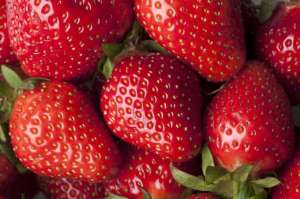
Problem: The pesticides used on non-organic strawberries are so incredibly harmful that the workers who spray them have to wear special suits to protect themselves!
Solution: Opt for organic! The Environmental Working Group, which analyzes U.S. Department of Agriculture pesticide-residue data, has found 13 different pesticide residues on chemically grown strawberries.
Bread
Problem: Modern wheat is nothing like the grain your mother or grandmother consumed. Today, wheat barely resembles its original form, thanks to extensive genetic manipulations of the 1960s and ’70s to increase yields. “You cannot change the basic characteristics of a plant without changing its genetics, biochemistry, and its effects on humans who consume it,” says William Davis, MD, cardiologist and author of the New York Times best-seller Wheat Belly.
In his book, Davis makes the case that modern-day wheat is triggering all sorts of health problems, everything from digestive diseases like celiac and inflammatory bowel disease to acid reflux, obesity, asthma, and skin disorders. “If there is a food that yields extravagant, extraordinary, and unexpected benefits when avoided, it is bread,” says Davis. “And I don’t mean white bread; I mean all bread: white, whole wheat, whole grain, sprouted, organic, French, Italian, fresh, day-old…all of it.”
Solution: Try eliminating bread from your diet for a few weeks to see if you note health improvements. When you do choose grains, look to things like quinoa, buckwheat, millet, and wild rice, but in smaller quantities (less than a half cup) because these can also trigger high blood sugar, Davis says.
Grapes
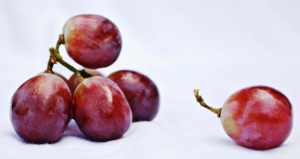
Problem: Grapes contain a sugar called dextrose, which is the highest glycemic sugar you could possibly put in your body.
Solution: There are plenty of other great fruits with good sugar like oranges.
Margarine

Problem: Margarine is brimming with empty calories and trans fat, the worst kind of fat you could possibly consume.
Solution: It may be bit pricier, but opt for the organic butter and add a few years to your life.
Yogurt
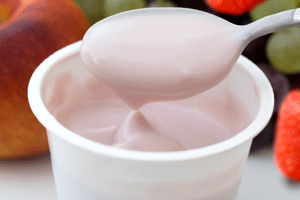
Problem: Sugar, sugar, sugar! Don’t believe the myth that yogurt is good for you when trying to lose weight. It is actually jam packed with sugar you don’t need and that your thighs will not appreciate.
Solution: Try eating healthy fruit for that sweet tooth instead.
Diet Soda
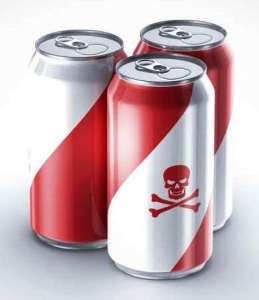
Problem: Stay away from any diet soda or foods, sugar-free candies, and gum containing artificial sweeteners such as sucralose, aspartame, acesulfame K, and neotame, among others. These sweeteners can cause health-related issues and problems related to metabolism and weight gain, neurological diseases, joint pain, digestive problems, headaches, depression, inflammatory bowel disease, chemical toxicity, and cancer, among others.
Solution: If you’re craving a soda but want to avoid the shady sweeteners, fake food dyes, and preservatives found in popular brands, try a bottle of Steaz zero-calorie green tea soda or Bionade, a fermented soda that’s majorly popular in Europe.
Canned Tomatoes
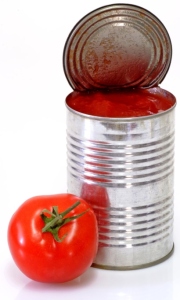
Problem: The resin linings of tin cans contain bisphenol-A, or BPA, a synthetic estrogen that has been linked to ailments ranging from reproductive problems to heart disease, diabetes, and obesity. Studies show that the BPA in most people’s bodies exceeds the amount that suppresses sperm production or causes chromosomal damage to the eggs of animals.
“You can get 50 micrograms of BPA per liter out of a tomato can, and that’s a level that is going to impact people, particularly the young,” says Frederick vom Saal, PhD, professor of biological sciences at the University of Missouri. “I won’t go near canned tomatoes.”
Solution: Choose tomatoes in glass bottles (which do not need resin linings), such as the brands Eden Organic and Bionaturae. You can also get several types in Tetra Pak boxes, such as Trader Joe’s and Pomi.
Chain Restaurant Ice Cream Sundaes

Problem: To make pure ice cream, all you need is milk, sugar, and maybe a little vanilla. But chain restaurants manage to load their ice cream with corn syrup, cellulose gum and vegetable shortening. In addition to being unhealthy, those additives are usually derived from genetically modified corn and soy.
Solution: Try making your own ice cream. Caramel sauce can be made with just sugar, butter, and heat, and you’ll never have to wonder what kind of chemicals you’re loading up on.
Industrially Produced Hamburgers

Problem: While a steak or roast usually comes from a single animal, processors of ground beef combine meat from hundreds of animals. This vastly increases the risk of contamination. USDA scientists have found dangerous levels of disease-causing bacteria in over 50% of ground beef samples they’ve tested.
Solution: Only eat hamburgers that are grass-fed and ground by a butcher.
Corn

Problem: Corn is so genetically modified and loaded with pesticides that it kills the bees that attempt to pollinate it! This food has pretty much just become a chemical pod that humans should not be allowed to consume. Sounds a little extreme, but it’s the truth.
Solution: In one way or another, corn is present in the vast majority of processed foods. From ketchup to salad dressing, and even bread, it’s hard to escape corn ingredients. Try to avoid foods containing high-fructose corn syrup. Not only is it unhealthy, but the pesticides used in the production of the corn is detrimental to honeybees and other pollinators.
To avoid genetically engineered corn, which has never been tested for long-term impacts on human health, choose organic or Non-GMO Verified foods.
Sprouts
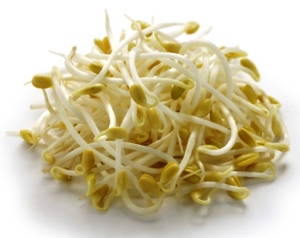
Problem: After being linked with major outbreaks of E. coli, salmonella and listeria, eating sprouts are just not worth the risk.
Whether bean or broccoli, alfalfa or pea, sprouts have been at the center of at least 40 significant outbreaks of foodborne illness over the past 20 years. They’re often found to be contaminated with salmonella, E. coli, and listeria; they’re vulnerable to contamination because the seeds require moist, warm conditions in order to sprout—conditions that are ideal for bacteria to multiply.
Solution: Get the crunch of sprouts—without the added bacteria—by shredding cabbage or carrots onto your sandwiches. If you really enjoy the flavor of sprouts, cook them first.
Butter-Flavored Microwave Popcorn

Problem: Diacetyl, a chemical used in butter flavoring, is used in a lot of fake butter flavorings, despite the fact that the chemical is so harmful to factory workers that it’s known to cause an occupational disease called “popcorn lung,” says Alexandra Scranton, director of science and research at Women’s Voices for the Earth, a nonprofit that advocates for environmental health issues that directly affect women.
After news of the chemical got out to the popcorn-eating public, companies started replacing diacetyl with another additive—which can actually turn into diacetyl under certain conditions, she adds. Neither chemical is disclosed on microwave-popcorn bags because the exact formulations of flavorings are considered trade secrets. “It’s a classic example of the need for better chemical regulation and improved transparency on the chemicals used in our food and other household products,” she says.
Solution: Make your own popcorn using real butter. Pop it on the stovetop in a pot, or go an easier route: Put a small handful of kernels into a brown paper lunch bag and stick the bag in the microwave. The kernels will pop just like those fake-butter-flavored kernels in standard microwave popcorn bags. When they’re done, pour some melted organic butter over them. “Makes pretty good popcorn at a fraction of the cost!” Scranton says.
Swordfish
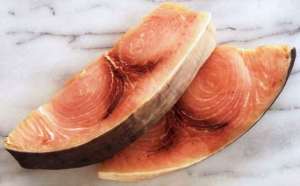
Problem: Swordfish is notoriously high in the heavy metal, a potent neurotoxin that can damage developing children and even trigger heart attacks in adults. Aside from obvious health concerns, swordfish is often overfished and some of the gear commonly used to wrangle in swordfish often kills turtles, seabirds, and sharks.
Solution: For a healthy omega-3 brain boost, look for fish that are low in contaminants and have stable populations, such as wild-caught Alaskan salmon, Atlantic mackerel, or pole- or troll-caught Pacific albacore tuna. Got a more adventurous palate? Try snakehead fish to satisfy your fish craving and improve the environment. The invasive species lives on land and water, where it wipes out important frogs, birds, and other critters. Snakehead fish is popping up on some restaurant menus, and the taste and texture is about identical to swordfish.
White Chocolate

Problem: The right kind of chocolate serves not only as a sweet treat but a brain-boosting superfood, too. The problem is, white chocolate’s health profile is blank. “The data on the health benefits of cacao is pretty awesome,” says Drew Ramsey, MD, assistant clinical professor of Psychiatry at Columbia University College of Physicians and Surgeons and coauthor of The Happiness Diet.
“Much of this is due to a set of amazing phytonutrients that can increase blood flow to the brain, protect blood vessels, and boost mood and focus. White chocolate is missing all this goodness.”
Solution: Indulging in a chocolate treat? Look for organic versions from companies like Theo and NibMor.
Artificial Sweeteners

Problem: Ironically, there’s a lot of evidence that suggest using artificial sweeteners, which have zero calories, is just as bad for your waistline as using regular, high-calorie sugar. For instance, research from the University of Texas has found that mice fed the artificial sweetener aspartame had higher blood sugar levels (which can cause you to overeat) than mice on an aspartame-free diet. Not only are they bad for your health, scientists have detected artificial sweeteners in treated wastewater, posing unknown risks to fish and other marine life. Plus, as Maria Rodale, CEO of Rodale Inc. and author of Organic Manifesto, says, “They’re unnatural, nonorganic, taste horrible, and lead to all sorts of bad health consequences, false expectations, and short-term strategic thinking.”
Solution: Refined white sugar isn’t any healthier, but you can replace it with small amounts of nutritional sweeteners, including honey, blackstrap molasses, and maple syrup, all of which have high levels of vitamins and minerals.
Food Dyes
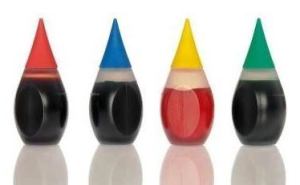
Problem: Dyes are basically just chemicals and these specific ones have been linked to cancer.
Health advocates have tried for years to get the Food and Drug Administration to ban food dyes, based on small studies linking them to hyperactivity in children and cancer in animals, and that’s one reason Michael F. Jacobson, PhD, executive director of the Center for Science in the Public Interest, avoids them. Red 3 has caused cancer in lab rats, and Yellow 5 and Yellow 6 may contain cancer-causing contaminants. But mainly, he says, he avoids them on principle. “I just don’t like eating synthetic chemicals and the oftentimes synthetic foods in which they’re used.”
His group criticizes companies that use food dyes to make foods appear healthier than they are and to replace truly healthy ingredients—in a report on the nutritional quality of fruit juices, the center noted that Tropicana Twister Cherry Berry Blast contains no berry and cherry juice but lots of the artificial dye, Red 40.
Solution: Read labels anytime you’re buying a prepackaged food. Food dyes can crop up in some really unexpected places, even healthy foods like cheese and yogurt.


The sugar in grapes is primarily fructose as in other fruits. Although fructose has a lower glycemic index it has a tendency to raise insulin levels and increase triglycerides. The glycemic index of a food is related not just to the type of food but also how quickly the sugar is absorbed. Grapes are not considered to have a high glycemic index. Dextrose is glucose.